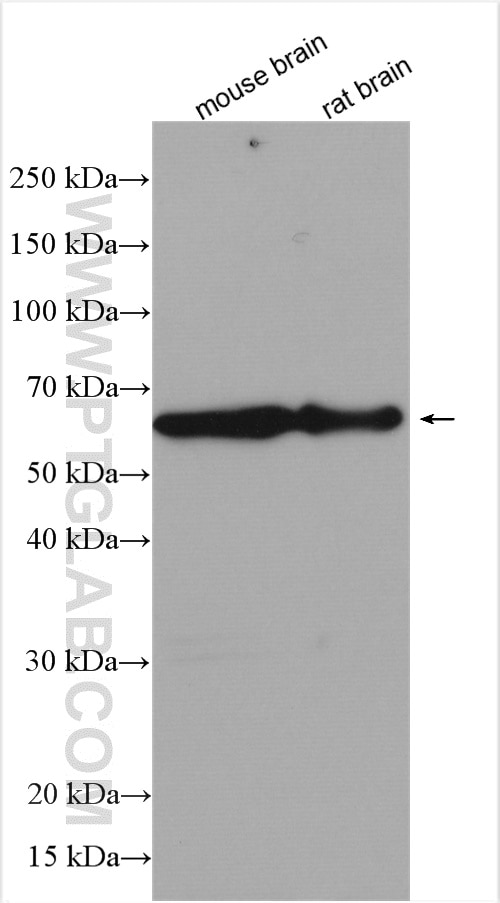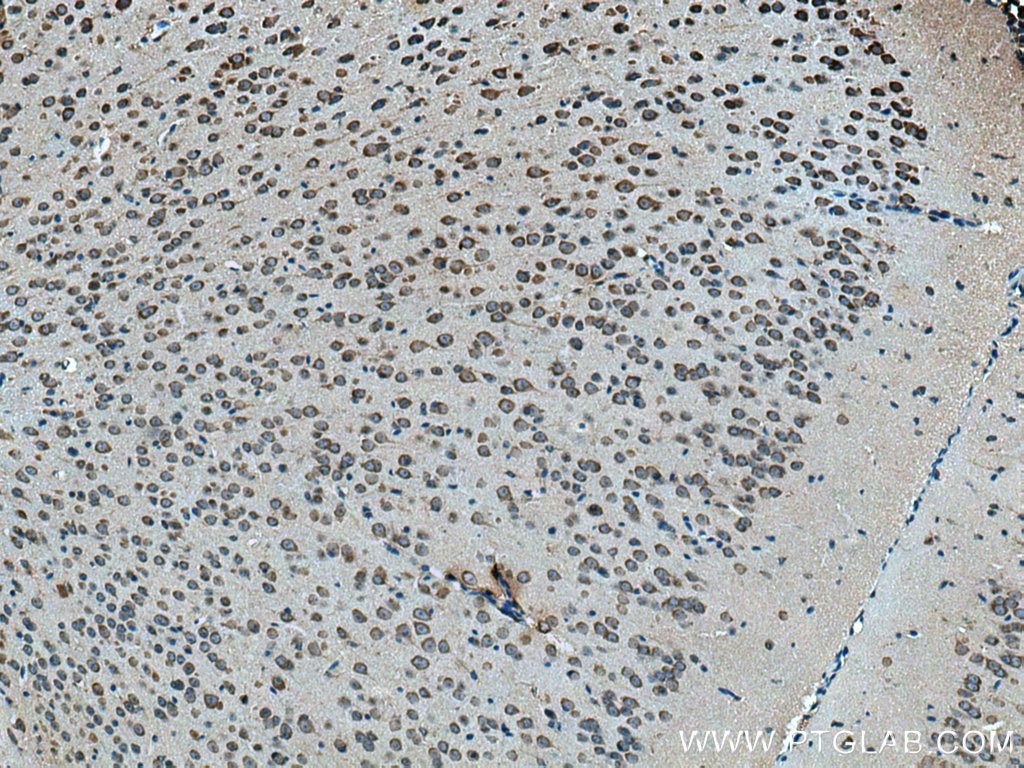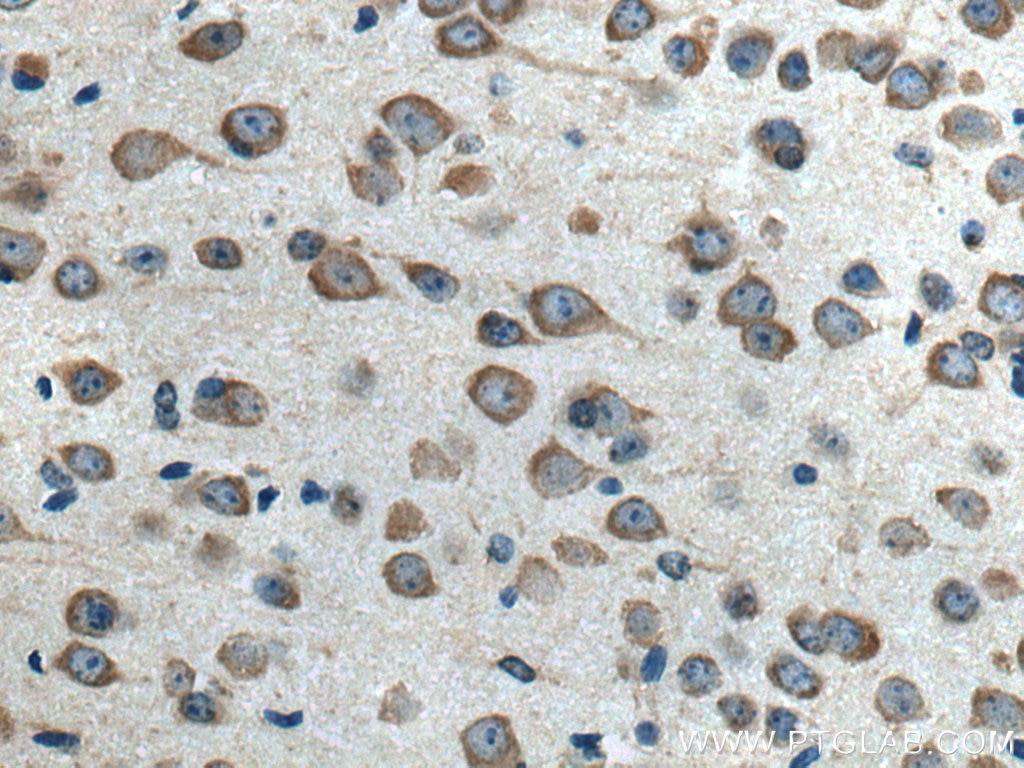Tested Applications
| Positive WB detected in | mouse brain tissue, rat brain tissue |
| Positive IHC detected in | mouse brain tissue Note: suggested antigen retrieval with TE buffer pH 9.0; (*) Alternatively, antigen retrieval may be performed with citrate buffer pH 6.0 |
Recommended dilution
| Application | Dilution |
|---|---|
| Western Blot (WB) | WB : 1:500-1:2000 |
| Immunohistochemistry (IHC) | IHC : 1:50-1:500 |
| It is recommended that this reagent should be titrated in each testing system to obtain optimal results. | |
| Sample-dependent, Check data in validation data gallery. | |
Published Applications
| WB | See 2 publications below |
| IHC | See 1 publications below |
Product Information
17016-1-AP targets ELP3 in WB, IHC, ELISA applications and shows reactivity with human, mouse, rat samples.
| Tested Reactivity | human, mouse, rat |
| Cited Reactivity | human |
| Host / Isotype | Rabbit / IgG |
| Class | Polyclonal |
| Type | Antibody |
| Immunogen |
CatNo: Ag9993 Product name: Recombinant human ELP3 protein Source: e coli.-derived, PGEX-4T Tag: GST Domain: 1-356 aa of BC001240 Sequence: MRQKRKGDLSPAELMMLTIGDVIKQLIEAHEQGKDIDLNKVKTKTAAKYGLSAQPRLVDIIAAVPPQYRKVLMPKLKAKPIRTASGIAVVAVMCKPHRCPHISFTGNICVYCPGGPDSDFEYSTQSYTGYEPTSMRAIRARYDPFLQTRHRIEQLKQLGHSVDKVEFIVMGGTFMALPEEYRDYFIRNLHDALSGHTSNNIYEAVKYSERSLTKCIGITIETRPDYCMKRHLSDMLTYGCTRLEIGVQSVYEDVARDTNRGHTVKAVCESFHLAKDSGFKVVAHMMPDLPNVGLERDIEQFTEFFENPAFRPDGLKLYPTLVIRGTGLYELWKSGRYKSYSPSDLVELVARILALV Predict reactive species |
| Full Name | elongation protein 3 homolog (S. cerevisiae) |
| Calculated Molecular Weight | 62 kDa |
| Observed Molecular Weight | 60-62 kDa |
| GenBank Accession Number | BC001240 |
| Gene Symbol | ELP3 |
| Gene ID (NCBI) | 55140 |
| RRID | AB_2918048 |
| Conjugate | Unconjugated |
| Form | Liquid |
| Purification Method | Antigen affinity purification |
| UNIPROT ID | Q9H9T3 |
| Storage Buffer | PBS with 0.02% sodium azide and 50% glycerol, pH 7.3. |
| Storage Conditions | Store at -20°C. Stable for one year after shipment. Aliquoting is unnecessary for -20oC storage. 20ul sizes contain 0.1% BSA. |
Protocols
| Product Specific Protocols | |
|---|---|
| IHC protocol for ELP3 antibody 17016-1-AP | Download protocol |
| WB protocol for ELP3 antibody 17016-1-AP | Download protocol |
| Standard Protocols | |
|---|---|
| Click here to view our Standard Protocols |
Publications
| Species | Application | Title |
|---|---|---|
J Clin Invest CIAO1 loss of function causes a neuromuscular disorder with compromise of nucleocytoplasmic Fe-S enzymes | ||
bioRxiv TDP-43 nuclear loss in FTD/ALS causes widespread alternative polyadenylation changes | ||
iScience RNA modification-related genes illuminate prognostic signature and mechanism in esophageal squamous cell carcinoma |








